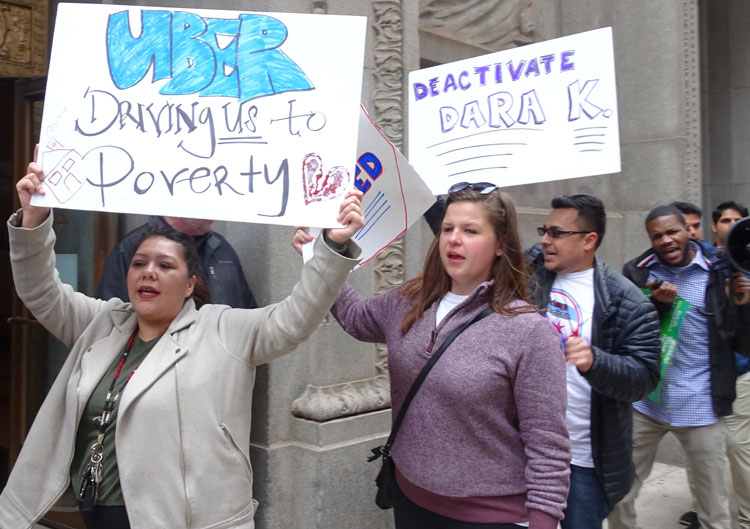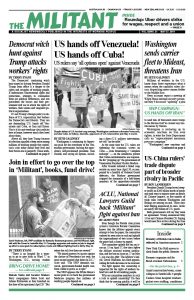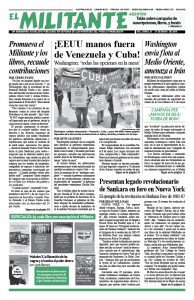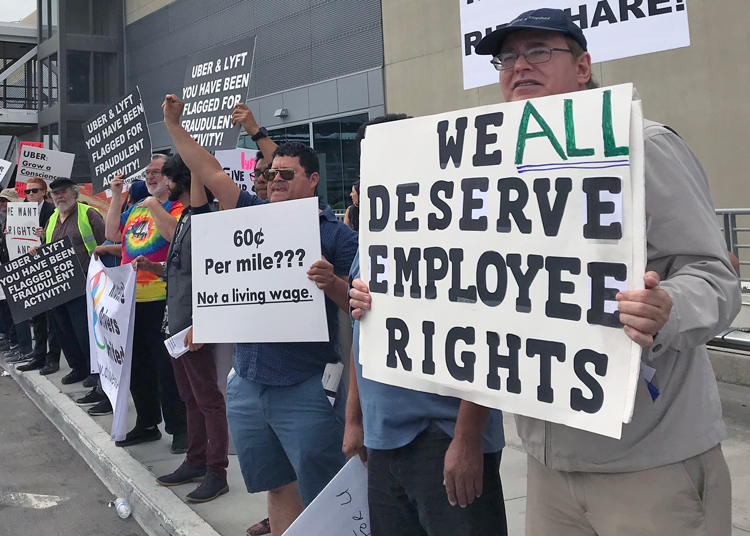On the eve of Uber’s much heralded first public stock offering May 10, Uber and Lyft drivers in at least 10 U.S. cities, plus several cities in Australia, the United Kingdom and Brazil, shut off their apps and joined protests May 8.
Though modest in size the strikes show that workers at the two giant e-hail companies are looking for ways to fight for higher pay and respect. They point to the need for one union for all drivers, from app-based, Yellow Cab and other car services.
A central part of the business “strategy” of the app-based companies is to convince drivers they are independent “owner-operators,” contractors, not workers who need a union. That way all the costs from car maintenance or rental, to gas, tickets, insurance and health care are on the driver, not the companies.
Some drivers “own” their car. Some rent from fleet owners. The bosses benefit by pitting drivers against each other in myriad ways including Yellow Taxi against app-based. An important challenge drivers are discussing is how to overcome these divisions and why they can’t rely on government regulations.
Among the drivers’ demands are better and more “transparent” pay, instead of it being “a big cloud of mystery,” and an end to arbitrary deactivations — the Uber equivalent of being suspended or fired. There are some 3 million Uber drivers around the world. There are more than 100,000 e-hail drivers in New York City and a similar number in Los Angeles, as well as thousands of “traditional” taxi drivers in those cities.
Much of the capitalist media stood behind the Uber bosses’ need to squeeze more out of the drivers if they’re ever going to turn a profit. “Strike All You Want. Uber Won’t Pay a Living Wage,” proclaimed a column by New York Times editorial board member Sarah Jeong. Her column was subtitled, “The Choice is Between Underpaying Drivers and Replacing Them With Robots.”
USA Today headlined its article the day of the strike, “Here’s Why the Uber, Lyft Protests Might Not Even Work,” and pushed Uber’s claim there was no impact on their daily operations.
But on its first day of public trading May 10 Uber shares fell over 7% below its $45 offering price, a “rare setback for a high profile IPO,” noted the Wall Street Journal.
Several hundred Uber and Lyft drivers and supporters picketed Uber headquarters in San Francisco May 8. “I’m making less than minimum wage working from 7 p.m. to 5 in the morning, with no overtime pay,” driver Erica Mighetto told the Militant. Drivers said the movement is just getting going, and more workers will see they can fight together.
“I am recommending a union for all these drivers. They think we are slaves. We are not slaves,” said driver Hasheem Shah.
“If we fight together they can’t fire all of us,” said Gary Branson. “We need benefits. Unity is key.”
In Los Angeles, hundreds of Uber and Lyft drivers shut off their apps for 24 hours and picketed the airport throughout the day. “We’re fighting for living wages,” Karim Bayumi said on the picket line. “For you to be taking your property and paying 90% of your expenses and getting 50% or less of the costs of the rides — this was not the agreement when I was hired.”
Deactivating drivers
In Atlanta, the recently formed Rideshare Drivers United Georgia held two rallies — one at the Uber hub and another at the Lyft hub, each attended by about 50 drivers and supporters. Several denounced how the companies arbitrarily deactivate drivers’ apps. “If a customer gives the driver a one-star rating, the company will deactivate you,” said Seiko Conte, who has been driving for Uber since 2016. “There’s no appeal, no giving your side of the story.”
Dozens of Uber and Lyft drivers in Chicago, and some cab drivers, held a picket line and press conference at City Hall. “App drivers, livery drivers and cab drivers are all trying to make a living,” taxi driver Nnamdi Uwazie told protesters. “We need to stand together for the drivers, not the corporations.” Uwazie is a member of Cab Drivers United, which is affiliated with the American Federation of State, County and Municipal Employees.

A “Driver Speak Out” at Seattle-Tacoma International Airport in Washington state of some 60 people was sponsored by Teamsters Local 117 and the App-Based Drivers Association, which is affiliated with the union. “The company says, ‘If you don’t like it, then leave,’” driver Walter Ellis said. “I say, if you don’t like it, then change it!”
In New York more than 200 drivers joined protests at Uber and Lyft’s headquarters in Long Island City — one in the morning sponsored by the Independent Drivers Guild and an afternoon action organized by the New York Taxi Workers Alliance. Most of the drivers there are immigrants from around the world, including Bhutan, Burkina Faso, China, India, Mali, Morocco, Nepal, Nigeria, Russia and Tibet.
Despite the bosses’ attempts to pit drivers against each other, Yellow Cab and limousine drivers came to give solidarity at the protests.
“I have no medical insurance. Uber gives us nothing,” Reza Saifan driver told the Militant at the afternoon protest. He has to take a month off for medical treatment. “No sick pay. How am I supposed to pay my bills with no income?”
‘We’re employees, not contractors’
“Uber must stop calling us independent contractors,” he added. “I don’t like it. They must call us their employees because we work for them. And we should not have to work more than eight hours to have more time to rest and take care of our families. To make one union, it makes lots of sense.”
At a rally in Melbourne, Australia, drivers chanted, “Uber, Uber, you must listen. We will break your algorithm!” Drivers also protested in Sydney and Brisbane.
In the United Kingdom, drivers in several cities, including London, Birmingham and Glasgow shut off their apps from 7 a.m. to 4 p.m. and picketed at Uber’s British headquarters in East London. “We have big potential power. We are more than 100,000 private hire drivers in London. If all of us take action it will have a big impact,” driver Ahmed Hussein told the Militant. Drivers also joined the one-day strike in Sao Paulo, Brazil.
Uber and Lyft are keeping fares low and foregoing profits for the time being, hoping to drive each other and their other rivals out of business. In 2018 Uber reported a loss of $3 billion on revenue of $11.3 billion and its debt reached nearly $8 billion.
Lyft launched its own IPO in March, but their stock has continued to fall. Investors are skeptical of the ability of the e-hail companies to turn a profit.
“As we aim to reduce Driver incentives to improve our financial performance, we expect Driver dissatisfaction will generally increase,” Uber admitted in its filing with the United States Securities and Exchange Commission.
That’s for sure.
Betsey Stone in San Francisco, Deborah Liatos in Los Angeles, Janice Lynn in Atlanta, Naomi Craine in Chicago, Edwin Fruit in Seattle, and Dag Tirsén in London contributed to this article.


